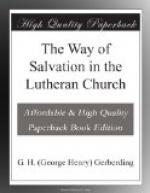The Lutheran Church does not so understand the teaching and claims of the Word concerning itself. According to her faith the Word of God is more than a book of information. It not only tells about sin and salvation, but delivers from sin and confers salvation. It not only points out the way of life, but it leads, nay more, we might say, it carries us into and along that way. It not only instructs concerning the need of the Holy Spirit, but it conveys that Spirit to the very mind and heart. It is indeed a precious truth, that this Word not only tells me what I must do to be saved, but it also enables me to do it. It is indeed the principal of the means of Grace. It is the vehicle and instrument of the Holy Spirit. Through it the Holy Spirit works repentance and faith. Through it He regenerates, converts, and sanctifies.
This is the doctrine of the Lutheran Church, concerning the use and efficacy of the divine Word. Thus, Luther’s Small Catechism, Apostles’ Creed, Art. III. explanation: “I believe that I cannot by my own reason or strength believe in Jesus Christ my Lord, or come to Him; but the Holy Spirit hath called me through the Gospel, enlightened me by His gifts,” etc. Thus also Augsburg Confession, Art. V.: “For by the Word and Sacraments, as by instruments, the Holy Spirit is given; who worketh faith, where and when it pleaseth God, in those that hear the Gospel,” etc.
Is this the teaching of the Word itself? Let us see. In John vi. 63, Jesus says: "The words that I speak unto you, they are spirit and they are life." In Romans i. 16, Paul says of the Gospel: "It is the power of God unto salvation to every one that believeth." Heb. iv. 12: "For the word of God is quick (living) and powerful, and sharper than any two-edged sword." 1 Peter i. 23: "Born again not of corruptible seed, but of incorruptible, by the Word of God, which liveth and abideth forever." James i. 21: "Receive with meekness the engrafted Word, which is able to save your souls." It is clear, therefore, that the Word does claim for itself virtue, life, power, and effectiveness.
But does it claim to be the Spirit’s means and instrument, by and through which He operates? In 2 Cor. iii. 8, it is called a “ministration of the Spirit.” In Eph. vi. 17, Paul calls it the “sword of the Spirit.”




